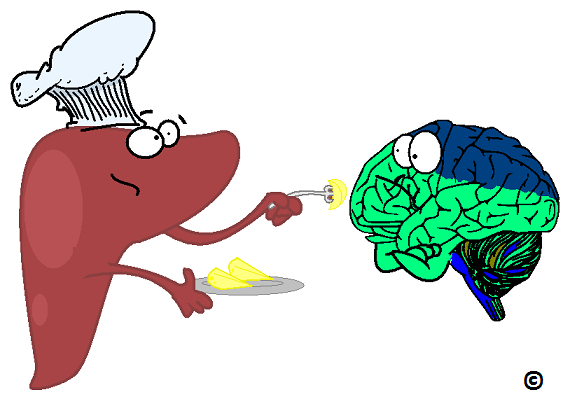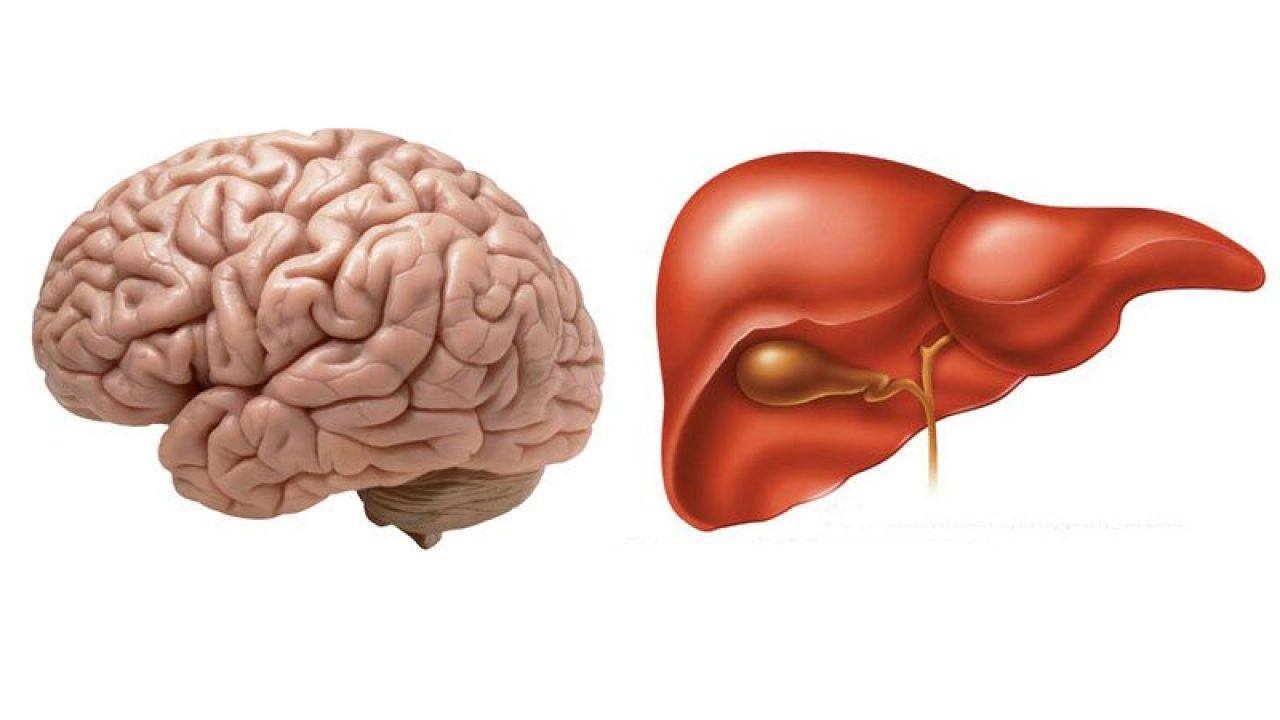بیماری کبد چرب می تواند به بروز بیماری های عصبی منجر شود

بیماری کبد چرب میتواند به بروز بیماریهای عصبی منجر شود
 پژوهشگران دانشگاه کارولینای جنوبی (USC) موفق شدهاند طی بررسی جدیدی، دلیل ارتباط میان بیماری کبد چرب غیر الکلی و مشکلات عصبی را کشف کنند. آنها در پژوهشهای خود، به بررسی نقش پروتئینی موسوم به لیپوکالین-۲ (Lipocalin-2) پرداختهاند که به التهاب عصبی منجر میشود و شاید بتواند گسترش بیماریهایی مانند آلزایمر و پارکینسون را در افراد مبتلا به کبد چرب توضیح دهد.
پژوهشگران دانشگاه کارولینای جنوبی (USC) موفق شدهاند طی بررسی جدیدی، دلیل ارتباط میان بیماری کبد چرب غیر الکلی و مشکلات عصبی را کشف کنند. آنها در پژوهشهای خود، به بررسی نقش پروتئینی موسوم به لیپوکالین-۲ (Lipocalin-2) پرداختهاند که به التهاب عصبی منجر میشود و شاید بتواند گسترش بیماریهایی مانند آلزایمر و پارکینسون را در افراد مبتلا به کبد چرب توضیح دهد.
این پژوهش، بر اساس یافتههای پژوهشهای پیشین انجام شده است که ارتباط میان مسیرها و مکانیسمهای میان کبد و میکروبیوم روده را با قسمتهای دیگر بدن نشان میدهند و بر بیماریهای کبد، سندروم متابولیک و اضافه وزن تمرکز دارند.
بسیاری از مردم جهان به بیماری کبد چرب مبتلا هستند، اما از آن خبر ندارند. این بیماری خاموش میتواند به سیروز کبدی، سرطان کبد، از بین رفتن کبد و بسیاری از بیماریهای کبدی دیگر منجر شود. یافتههای این پژوهش نه تنها ارتباط میان بیماری کبد چرب و التهاب عصبی را تایید میکند، بلکه نحوه پیش آمدن آن را هم توضیح میدهد.
در مقاله این پژوهش آمده است: لیپوکالین-۲، یکی از پروتئینهای مهمی است که در کبد تولید میشود و با جریان خون، در سراسر بدن فرد مبتلا به کبد چرب غیر الکلی به گردش درمیآید. اهمیت نتایج پژوهش ما به این دلیل است که افراد مبتلا به بیماری کبد چرب، نشانههای آلزایمر و پارکینسون را در سنین بالاتر بروز میدهند. دانشمندان میتوانند از یافتههای این پژوهش، برای درک بهتر پیامدهای التهاب عصبی در بیماران مبتلا به کبد چرب و ارائه درمان بهتر استفاده کنند.
گزارشهای مراکز کنترل و پیشگیری بیماری آمریکا نشان میدهد ۹۰ درصد افراد مبتلا به اضافه وزن و بین ۴۰ تا ۷۰ درصد افراد مبتلا به دیابت نوع دو، به بیماری کبد چرب نیز مبتلا هستند. موارد خطرناک دیگر نیز کلسترول بالا، فشار خون بالا و سندروم متابولیک را شامل میشوند.
این پژوهش نشان میدهد افرادی که بیشتر در معرض خطر بیماری کبد هستند، لیپوکالین-۲ بیشتری در خون خود دارند و امکان بروز التهاب مغزی نیز در آنها بیشتر است.
پراکاش ناگارکاتی (Prakash Nagarkatti)، از پژوهشگران این پروژه گفت: التهاب مزمن، یک عامل مهم در آغاز بیماریهای عصبی به شمار میرود. شاید پژوهش ما بتواند به ارائه درمانهای جدیدی برای التهاب عصبی کمک کند.
 Research from University of South Carolina associate professor Saurabh Chatterjee’s laboratory in Environmental Health Sciences, Arnold School of Public Health, and led by Ayan Mondal, a postdoctoral researcher from the same lab, has revealed the cause behind the previously established link between non-alcoholic fatty liver disease (i.e., NAFLD, recently reclassified as metabolic associated fatty liver disease or MAFLD) and neurological problems. The link they discovered, the unique role of an adipokine (Lipocalin-2) in causing neuroinflammation, may explain the prevalence of neurological Alzheimer’s disease-like and Parkinson’s disease-like phenotypes among individuals with MAFLD.
Research from University of South Carolina associate professor Saurabh Chatterjee’s laboratory in Environmental Health Sciences, Arnold School of Public Health, and led by Ayan Mondal, a postdoctoral researcher from the same lab, has revealed the cause behind the previously established link between non-alcoholic fatty liver disease (i.e., NAFLD, recently reclassified as metabolic associated fatty liver disease or MAFLD) and neurological problems. The link they discovered, the unique role of an adipokine (Lipocalin-2) in causing neuroinflammation, may explain the prevalence of neurological Alzheimer’s disease-like and Parkinson’s disease-like phenotypes among individuals with MAFLD.
The investigators, which include members of Chatterjee’s Environment Health & Disease Laboratory and researchers from across UofSC, published their results in theJournal of Neuroinflammation, a pioneering journal in the field. These findings build on years of research conducted by the interdisciplinary team, which has unearthed previously unknown pathways and mechanisms between the liver and the gut microbiome with other parts of the body through their focus on how environmental toxins contribute to liver disease, metabolic syndrome and obesity.
MAFLD affects up to 25 percent of Americans and much of the global population – many of whom are unaware of their condition. Yet the effects of this silent disease are far-reaching, possibly leading to cirrhosis, liver cancer/failure and other liver diseases. The findings from the current study not only confirm the strong correlation between MAFLD and neuroinflammation/neurodegeneration that has been established by other recent research, but it explains how this happens.
Ninety percent of the obese population and 40 – ۷۰ percent of those with type 2 diabetes appear to have MAFLD, according to the Centers for Disease Control and Prevention. In addition to overweight/obese status and diabetes, other risk factors include high cholesterol and/or triglycerides, high blood pressure and metabolic syndrome.
These individuals have a higher risk for having diseased livers, which are associated with increased lipocalin 2 – as found in the present study. The lipocalin 2 circulates throughout the body at higher levels, possibly inducing inflammation in the brain.
“Chronic neuroinflammation is a critical element in the onset and progression of neurodegenerative diseases, including Alzheimer’s disease,” says Prakash Nagarkatti, UofSC Vice President for Research and a member of the research team.
امتیاز نوشته:
میانگین امتیازها: ۰ / ۵. تعداد آراء: ۰
اولین نفری باشید که به این پست امتیاز میدهید.

